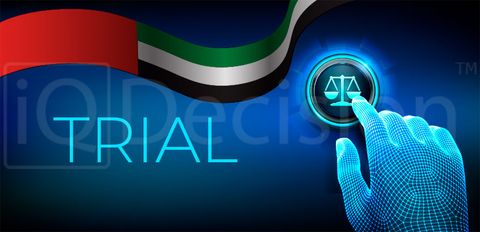To file a claim with a 1st instance court, one has to file an application & pay a court fee. After a subpoena is served on a defendant, a court can hold its 1st hearing. Normally, courts do not require witnesses to provide oral testimony. Reviewing of cases is done by analyzing documentary evidence & legal documents submitted by parties.
When settling a commercial dispute through litigation in the Emirates, parties frequently seek expert help. Entrusted with providing quantitative analysis, experts are chosen from registers maintained by courts. Normally, resolving commercial disputes by litigation in the Emirates requires up to a year; particularly complex cases may require a year and a half & even more. It takes less time to appeal a decision with an appellate court (up to one year) or a court of cassation (two tears).
A simplified procedure may be used for dealing with certain cases. Presiding judges can resolve disputes in the Emirates whose value amounts up to one hundred thousand AED (or twenty seven thousand dollars). Normally, cases like this are submitted for consideration within two weeks from the filing date. Decisions made under simplified procedure are deemed final & can’t be appealed if an amount claimed doesn’t exceed fifty thousand AED (or thirteen thousand dollars) or twenty thousand AED (or five thousand dollars) for employment claims.
Settling International Disputes in the Emirates
Initiating DIFC proceedings requires filing:
- SCT claims:
- a claim falling under SCT jurisdiction, if their amount doesn’t exceed five hundred thousand AED (one hundred thirty six dollars);
- claims relates to employment & reviewed by the SCT;
- a claim whose amount doesn’t exceed one million AED (two hundred seventy thousand dollars), if there’s written consent that SCT will consider it.
Claims Beyond SCT Jurisdiction
Resolving a dispute with a DIFC court in the Emirates requires one to file a claim within four months of the filing date. After that, plaintiffs must provide a court with a claim’s details, while defendants must present a defense no later than twenty eight days after getting a claim. A 1st hearing is normally held after a claim is filed (within 6 to 9 months); decisions are usually made after hearings (within 1 to 3 months). If an appeal is filed against the decision of a 1st instance court, it may take an appellate court one year to hand down its own decision.
Resolving Disputes in an ADGM Court
To initiate litigation with an ADGM court, one has to file a claim (the most popular one is CFI-1). Containing details of a claim, it must be submitted within 4 months of the filing date. Defendants must submit a defense within one month from the filing date. Plaintiffs are to respond to a defendant’s defense within twenty one days.
Travel Bans
While resolving disputes by litigation in the Emirates, plaintiffs can request that a court issue a ban on travel. Imposing a ban requires meeting 3 conditions:
- it’s highly likely that defendants may flee the country;
- indebtedness must be confirmed & well-known;
- an amount owed must be less than one thousand AED (two hundred seventy dollars) or ten thousand AED (two thousand dollars) for substantial claims.
Once a ban is issued, courts must notify all airports, seaports & railway stations of its issuance. They may also require defendants to submit their passports to courts’ treasury. A travel ban is normally imposed while a criminal investigation is ongoing; their issuance depends on debtors’ ability to adhere to enforceable judgments. Normally, making a decision on the issuance of a travel ban requires up to five business days.
Preventive Orders
When settling disputes by litigation in the Emirates, plaintiffs may request that a court issue a preventive order. Normally, a preventive order is issued to freeze defendants’ assets. Issuing a preventive order requires a court to have reliable evidence that defendants are highly likely to spend their assets before a decision is rendered. Normally, it takes a court up to six days to issue a preventive order.
Interim Order
Interim orders can be issued by ADGM & DIFC courts. To issue one, no prior notification of a defendant about a decision to start legal proceedings in the Emirates is required. Temporary remedies normally include:
- an injunction;
- a freeze order;
- a disclosure order.
Judgments Rendered by Foreign Courts
Those seeking to initiate litigation in the Emirates should keep in mind that decisions rendered by courts abroad are enforceable in 3 ways:
- based on bilateral treaties;
- based on the Law on Civil Procedure;
- via an ADGM or DIFC court.
A DIFC or ADGM court can enforce judgments rendered by courts abroad. To enforce one, one has to file a claim. After a judgment is recognized, a Dubai court can enforce it by simplified procedure; it can also be enforced by an ADGM court as per the MoU.
Financing Litigation
Settling international disputes in the Emirates makes it possible for 3rd parties to cover arbitration- or litigation-related costs.
Considering settling a dispute through litigation in the Emirates? Need advice on arbitration regulation in the Emirates? Why not reach out to IQ Decision UK?

















